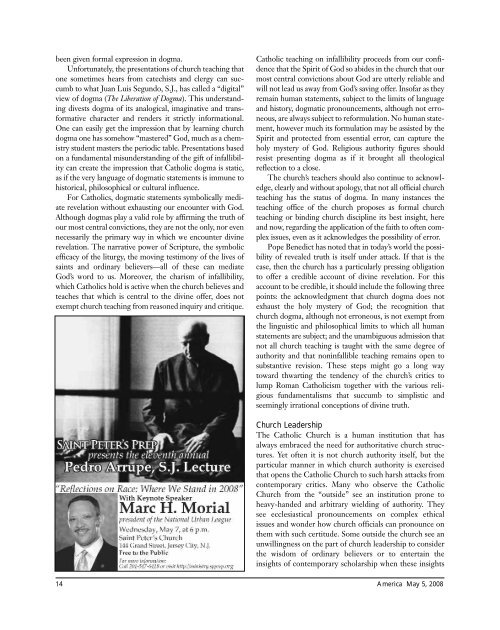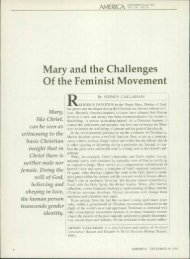Download PDF - America
Download PDF - America
Download PDF - America
You also want an ePaper? Increase the reach of your titles
YUMPU automatically turns print PDFs into web optimized ePapers that Google loves.
een given formal expression in dogma.Unfortunately, the presentations of church teaching thatone sometimes hears from catechists and clergy can succumbto what Juan Luis Segundo, S.J., has called a “digital”view of dogma (The Liberation of Dogma). This understandingdivests dogma of its analogical, imaginative and transformativecharacter and renders it strictly informational.One can easily get the impression that by learning churchdogma one has somehow “mastered” God, much as a chemistrystudent masters the periodic table. Presentations basedon a fundamental misunderstanding of the gift of infallibilitycan create the impression that Catholic dogma is static,as if the very language of dogmatic statements is immune tohistorical, philosophical or cultural influence.For Catholics, dogmatic statements symbolically mediaterevelation without exhausting our encounter with God.Although dogmas play a valid role by affirming the truth ofour most central convictions, they are not the only, nor evennecessarily the primary way in which we encounter divinerevelation. The narrative power of Scripture, the symbolicefficacy of the liturgy, the moving testimony of the lives ofsaints and ordinary believers—all of these can mediateGod’s word to us. Moreover, the charism of infallibility,which Catholics hold is active when the church believes andteaches that which is central to the divine offer, does notexempt church teaching from reasoned inquiry and critique.Catholic teaching on infallibility proceeds from our confidencethat the Spirit of God so abides in the church that ourmost central convictions about God are utterly reliable andwill not lead us away from God’s saving offer. Insofar as theyremain human statements, subject to the limits of languageand history, dogmatic pronouncements, although not erroneous,are always subject to reformulation. No human statement,however much its formulation may be assisted by theSpirit and protected from essential error, can capture theholy mystery of God. Religious authority figures shouldresist presenting dogma as if it brought all theologicalreflection to a close.The church’s teachers should also continue to acknowledge,clearly and without apology, that not all official churchteaching has the status of dogma. In many instances theteaching office of the church proposes as formal churchteaching or binding church discipline its best insight, hereand now, regarding the application of the faith to often complexissues, even as it acknowledges the possibility of error.Pope Benedict has noted that in today’s world the possibilityof revealed truth is itself under attack. If that is thecase, then the church has a particularly pressing obligationto offer a credible account of divine revelation. For thisaccount to be credible, it should include the following threepoints: the acknowledgment that church dogma does notexhaust the holy mystery of God; the recognition thatchurch dogma, although not erroneous, is not exempt fromthe linguistic and philosophical limits to which all humanstatements are subject; and the unambiguous admission thatnot all church teaching is taught with the same degree ofauthority and that noninfallible teaching remains open tosubstantive revision. These steps might go a long waytoward thwarting the tendency of the church’s critics tolump Roman Catholicism together with the various religiousfundamentalisms that succumb to simplistic andseemingly irrational conceptions of divine truth.Church LeadershipThe Catholic Church is a human institution that hasalways embraced the need for authoritative church structures.Yet often it is not church authority itself, but theparticular manner in which church authority is exercisedthat opens the Catholic Church to such harsh attacks fromcontemporary critics. Many who observe the CatholicChurch from the “outside” see an institution prone toheavy-handed and arbitrary wielding of authority. Theysee ecclesiastical pronouncements on complex ethicalissues and wonder how church officials can pronounce onthem with such certitude. Some outside the church see anunwillingness on the part of church leadership to considerthe wisdom of ordinary believers or to entertain theinsights of contemporary scholarship when these insights14 <strong>America</strong> May 5, 2008









